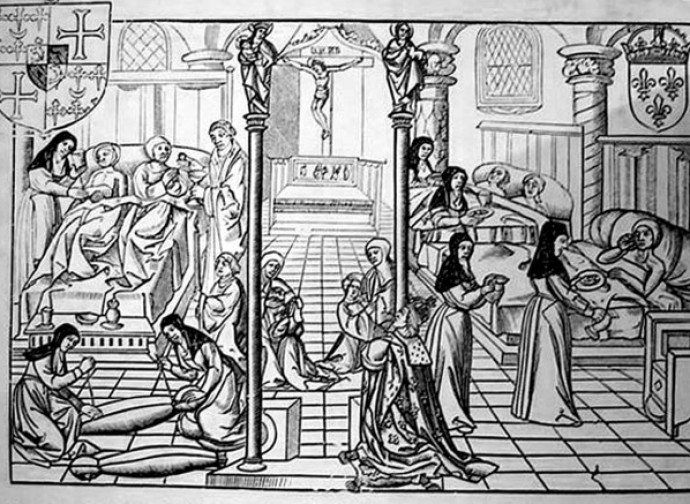Saint Landry of Paris
The first hospital in Paris, the Hôtel-Dieu (“Hostel of God”), and the oldest in the world still in operation was founded in 651 by Saint Landry (Landericus). The saint had the idea and the charity to gather the sick under one roof in order to improve their treatment and reduce the risks of contagion, at a time when epidemics were fairly frequent.

The first hospital in Paris, the Hôtel-Dieu (“Hostel of God”), and the oldest in the world still in operation was founded in 651 by Saint Landry (Landericus). The saint had the idea and the charity to gather the sick under one roof in order to improve their treatment and reduce the risks of contagion, at a time when epidemics were fairly frequent. In this work of caring for the neediest, which continued over the centuries until the Hôtel-Dieu became the symbol of charity in Paris, he was helped by a community of nuns and some Christian nobles, who served food and medicine to the poor and the sick. In 651 Paris was also afflicted by a famine; Landry, who had become bishop of the city around 650 (succeeding Audobertus), sold all his personal property to feed the poor.
Saint Landry was one of the twenty-four bishops who in 653 signed the charter Clovis II gave to Saint-Denis Abbey (founded a few years earlier, under King Dagobert) exempting it from episcopal jurisdiction. Clovis was the husband of Saint Bathilde, who in those years fostered the founding of numerous monasteries.
Before becoming bishop, Landry had acted as referendary at the Merovingian court. It was he who instructed a monk named Marcolfus to write the Formulae, a collection of formulas used for a variety of legal issues.
Saint Landry is also credited with having built the Parisian church of Saint-Germain l'Auxerrois, which later became the main parish of the royalty of France. He died around 656 and was buried in this church, where there is a chapel dedicated to him. During the French Revolution, as happened with the bodies of several other saints, the revolutionary fury caused the dispersion of most of his relics.
